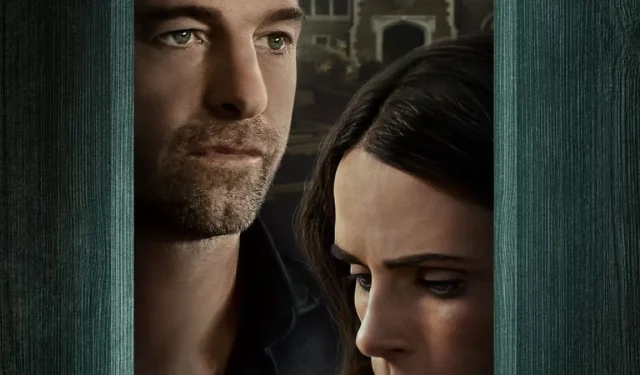
The film *Cellar Door* revolves around a couple who have faced the agony of a miscarriage. As someone who has navigated the challenges of infertility, I find that horror can be a powerful medium to delve into the themes of parenthood and the sorrow of losing a child. Unfortunately, *Cellar Door* opts for melodramatic relationship elements instead.
Directed by Vaughn Stein, *Cellar Door* follows John (played by Scott Speedman) and Sera (portrayed by Jordana Brewster), a couple dealing with the heartache of a miscarriage after conceiving through IVF. They unexpectedly inherit their dream home from a wealthy benefactor (Lawrence Fishburne), but with one peculiar stipulation: they must never open the cellar door.
This premise is intriguing. Horror enthusiasts may recall films such as *The Babadook*, *Huesera (The Bone Woman)*, or the *Friday the 13th* franchise—each reflecting on parental feelings and loss. Unfortunately, *Cellar Door* does not capitalize on this potential. The couple’s desire for parenthood is overshadowed by uninspired melodrama reminiscent of early 2000s television, alongside a central mystery that loses significance as the plot unfolds.
Characters with Influence and Wealth
The film effectively introduces John and Sera as they select colors for their nursery, giving insight into their personalities and dynamics as a couple. They come across as a relatable, decent pair.
Following Sera’s miscarriage, there’s a fleeting scene where she sits despondently at the piano, declaring, “We can’t stay here” (referring to their lavish city apartment). John responds, “I know.” The next moment, they are searching for a new home in a quieter environment. What led them to believe that responding to the loss of a baby meant uprooting their lives? What characteristics justify selling their apartment and embarking on a house hunt? Where was the dialogue or conflict regarding this decision?
While it’s understandable to avoid living in a place filled with memories of trauma, it’s worth noting that many people experience miscarriages, and most can’t simply move on to dodge their memories. Nonetheless, the plot needed progression.
This situation brought to mind *The Flash*’s “Flashpoint” narrative, where Barry Allen uses his speed to alter timelines, aiming to save his mother. After losing my own parents, I was forced to confront and accept their deaths amid my sorrow. Unlike superheroes, most individuals lack the ability to magically change their past. This unrealistic portrayal irked me, as supernatural abilities allow these characters to sidestep the weight of grief and mental health, distractible by thrilling escapades.
In contrast, a film focusing on actual human experiences should resonate differently. The reality is that John and Sera avoid confronting their grief, preferring to dive into a house search and the ensuing drama instead. A well-crafted narrative typically showcases character evolution, but *Cellar Door* leaves its protagonists unchanged, with no lessons learned.
Why Are Two Women Fixated on This Dull Liar?
I anticipated that a film addressing a couple after a miscarriage might feature a strong female character at its core. However, we are left to accept that rather than confronting her unfaithful partner (who deceives her in numerous ways), Sera pursues extreme measures to hold onto him. Although she is a mathematician, apparently valuing reasoned decisions, she behaves irrationally at several points without any prior indication.
Conversely, the “other woman,” Alyssa (Addison Timlin), struggles to comprehend her affair partner’s refusal to leave his spouse and engages in increasingly harmful actions. Elements of the #MeToo movement appear, yet they are poorly executed, potentially reinforcing the narrative that many women who report abuse or assault are dishonest.
Essentially, the film portrays its prominent female characters as “crazy,” which is quite disappointing. Furthermore, both women obsess over an unimpressive man. John is presented as a shallow figure, free to act without consequences, while his eventual repercussions fail to instigate any personal change.
This Could Have Been Acceptable with Better Storytelling
These character arcs and story choices might have found success with more skillful direction. Unfortunately, *Cellar Door* does not deliver on that front. What began as a potentially touching exploration of grief devolves into a melodramatic saga of two women vying for the affection of a man, who does everything he can to evade reality.
This struggle is framed in more serious terms than the storyline merits. The condition of never opening the cellar door is depicted as a metaphor for…something? Yet, this notion lacks real exploration or resolution. Moreover, the film’s overall quality—its cinematography, color palette, and supporting performances—suggests a production better suited for Lifetime rather than a theatrical release. While Lifetime has its own distinct charm, this film needed a more capable hand at storytelling to tackle its troubling themes. Instead, *Cellar Door* ultimately disappoints.
Lionsgate’s *Cellar Door* hits select theaters and digital platforms on November 1.
Images Credit: Themarysue.com



Leave a Reply